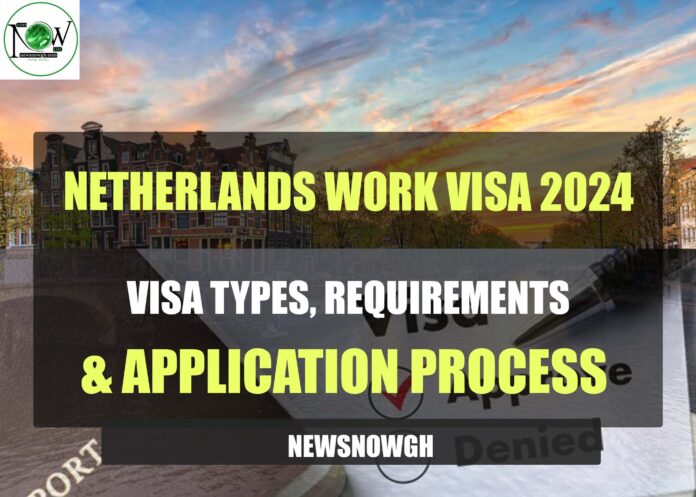Netherlands Work Visa 2024: Visa Types, Requirements & Application Process
The Netherlands is a popular location for professionals looking for job opportunities in Europe, and the Netherlands Work Visa permits non-EU/EEA people to live and work there. Workers in sectors including technology, engineering, healthcare, and finance are drawn to the Netherlands because of its robust labor market, high standard of life, and dynamic economy.
It is a desirable alternative for professionals wishing to broaden their job horizons because of its advantageous position in Europe and access to other EU member states.
With choices including the Highly Skilled Migrant Visa, EU Blue Card, and Intra-corporate Transferee Permit, the visa application process is made to accommodate the demands of both skilled and unskilled workers. In the process, employers are important since they frequently serve as sponsors for potential hires.
By working together, the business and the Immigration and Naturalization Service (IND) can guarantee that only eligible applicants who have received genuine employment offers will be allowed admission, promoting the nation’s economic expansion and upholding a managed immigration system.
The Netherlands’ work visa system has been updated for 2024 to take into account continuous efforts to expedite immigration procedures and meet labor market demands. The Netherlands has established salary standards and other requirements that guarantee equitable employment and chances for professional progression, to recruit highly trained individuals.
This work visa improves the overall quality of life for expatriates and their families by providing access to the Dutch social security, healthcare, and educational systems in addition to opening avenues for professional advancement.
Benefits of the Netherlands Work Visa
- EU Labor Market Access: Holders of work visas may be able to find employment in other EU/Schengen nations.
- Families: Those with valid visas are permitted to bring their spouses and kids to the Netherlands.
- Healthcare & Social Security: Dutch healthcare, social security, and pension benefits are available to workers.
- Education Opportunities: The Dutch educational system is advantageous to family members.
- Professional Development: The Netherlands has opportunities in the fields of engineering, finance, healthcare, and information technology.
Eligibility Criteria for the Netherlands Work Visa
- Nationality: A work visa is typically required for non-EU/EEA citizens.
- Qualifications: Professional experience and related education are required of applicants.
- Higher education degrees or specialized knowledge are required for a Highly Skilled Migrant Visa.
- Proof of advanced education (a bachelor’s degree or above) is needed to be eligible for the EU Blue Card.
- Work Offer: It is necessary to have a verified work offer from a Dutch business.
- Employer’s Role: The Dutch Immigration and Naturalization Service (IND) requires employers to be recognized sponsors.
- Specialized Industries: Specific visa pathways exist for several industries, such as IT, engineering, and healthcare.
Required Documents
- Valid Passport: The passport must be valid for the entire planned stay, plus six months.
- Employment Contract: A Dutch employer’s formal offer of employment.
- Transcripts and certificates of education serve as proof of qualifications.
- Updated with pertinent work experience on the CV or resume.
- Application Form Completed: obtainable on the IND website.
- Passport-size picture following Schengen visa requirements.
- Evidence of Financial Resources: Showcasing the capacity to sustain oneself.
- Health insurance: Needs to be up to date with Dutch laws.
- Criminal Background Check: From the national law enforcement agency.
Duration of the Visa
Validity:
- Highly Skilled Migrant Visa: Usually issued for the length of the job agreement, up to a maximum of five years.
- EU Blue Card: Renewal options available; maximum validity of four years.
- A seasonal worker’s visa is often only good for six months.
- Renewal: Applications for a renewal must be filed before the expiration of the current visa.
Pathway to Permanent Residency:
- Applicants may be eligible for permanent residency after five years of lawful presence.
- It can be necessary to understand the Dutch language and culture to become a resident or citizen.
Types of Netherlands Work Visas
1. Highly Skilled Migrant Visa:
- This is for experts who make more money than a certain amount.
- Provides fewer administrative procedures and a simplified application process.
2. EU Blue Card:
- Intended for non-EU citizens who have completed college and have been offered a job that pays more than a specific amount.
- Permits employment in other EU member states.
3. Intra-Corporate Transferee (ICT) Permit:
- For workers moving to a Dutch branch of the same company.
- Permits temporary residency in the event of a move of job.
4. Seasonal Work Visa:
- For positions in tourism, horticulture, or agriculture.
- Usually good for a maximum of half a year.
Application Process for the Netherlands Work Visa
- Job Offer: Get employment in the Netherlands with a reputable company.
- Employer Concerning IND: On behalf of the worker, the employer applies for a work visa.
- Send in Documents: Gather and deliver the necessary paperwork to the Dutch embassy or consulate that is closest to you.
- Make an appointment for a biometric examination, such as fingerprinting and photo taking.
- Visa Decision: Depending on the type of visa, processing periods can vary from two to eight weeks.
- Entry into the Netherlands: The holder of the visa is permitted entry into the Netherlands upon approval.
Follow us on Newsnowgh.com to stay updated on the latest information regarding work permits, visa application processes, paths to permanent residency, and visa-sponsored employment.


